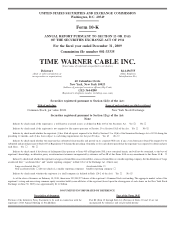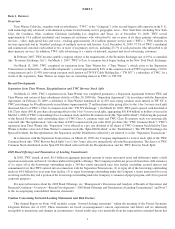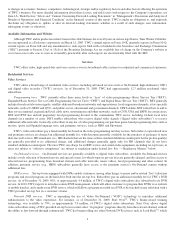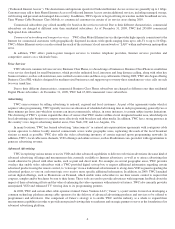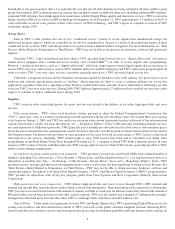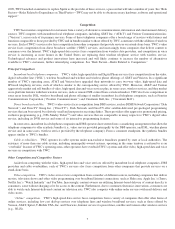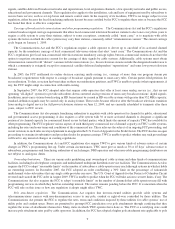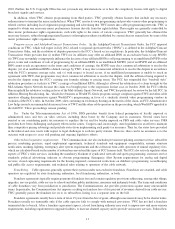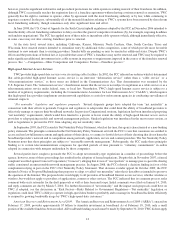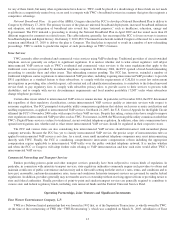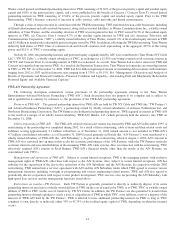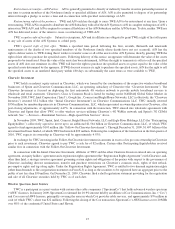Time Warner Cable 2009 Annual Report Download - page 19
Download and view the complete annual report
Please find page 19 of the 2009 Time Warner Cable annual report below. You can navigate through the pages in the report by either clicking on the pages listed below, or by using the keyword search tool below to find specific information within the annual report.2009, TWC launched an initiative to replace Sprint as the provider of these services, a process that will take a number of years. See “Risk
Factors—Risks Related to Dependence on Third Parties—TWC may not be able to obtain necessary hardware, software and operational
support.”
Competition
TWC faces intense competition for customers from a variety of alternative communications, information and entertainment delivery
sources. TWC competes with incumbent local telephone companies, including AT&T Inc. (“AT&T”) and Verizon Communications Inc.
(“Verizon”), across each of its primary services. Some of these telephone companies offer a broad range of services with features and
functions comparable to those provided by TWC and in bundles similar to those offered by TWC, sometimes with the addition of wireless
services. Each of TWC’s services also faces competition from other companies that provide services on a stand-alone basis. TWC’s video
service faces competition from direct broadcast satellite (“DBS”) services, and increasingly from companies that deliver content to
consumers over the Internet. TWC’s high-speed data service faces competition from wireless data providers, and competition in voice
service is increasing as more homes in the United States are replacing their wireline telephone service with wireless service.
Technological advances and product innovations have increased and will likely continue to increase the number of alternatives
available to TWC’s customers, further intensifying competition. See “Risk Factors—Risks Related to Competition.”
Principal Competitors
Incumbent local telephone companies. TWC’s video, high-speed data and Digital Phone services face competition from the video,
digital subscriber line (“DSL”), wireless broadband and wireline and wireless phone offerings of AT&T and Verizon. In a significant
number of TWC’s operating areas, AT&T and Verizon have upgraded their networks to carry two-way video, high-speed data and
IP-based telephony services, each of which is similar to the corresponding service offered by TWC. Moreover, AT&T and Verizon
aggressively market and sell bundles of video, high-speed data and voice services plus, in some cases, wireless services, and they market
cross-platform features with their wireless services, such as remote DVR control from a wireless handset. TWC also faces competition in
some areas from the DSL, wireless broadband and phone offerings of smaller incumbent local telephone companies, such as Frontier
Communications Corporation (“Frontier Communications”) and Cincinnati Bell, Inc. (“Cincinnati Bell”).
Direct broadcast satellite. TWC’s video service faces competition from DBS services, such as DISH Network Corporation (“Dish
Network”) and DirecTV Group Inc. (“DirecTV”). Dish Network and DirecTV offer satellite-delivered pre-packaged programming
services that can be received by relatively small and inexpensive receiving dishes. These providers offer aggressive promotional pricing,
exclusive programming (e.g., NFL Sunday Ticket
TM
) and video services that are comparable in many respects to TWC’s digital video
service, including its DVR service and some of its interactive programming features.
In some areas, incumbent local telephone companies and DBS operators have entered into co-marketing arrangements that allow the
telephone companies to offer synthetic bundles (i.e., video service provided principally by the DBS operator, and DSL, wireline phone
service and, in some cases, wireless service provided by the telephone company). From a consumer standpoint, the synthetic bundles
appear similar to TWC’s bundles.
Cable overbuilders. TWC operates its cable systems under non-exclusive franchises granted by state or local authorities. The
existence of more than one cable system, including municipality-owned systems, operating in the same territory is referred to as an
“overbuild.” In some of TWC’s operating areas, other operators have overbuilt TWC’s systems and offer video, high-speed data and voice
services in competition with TWC.
Other Competition and Competitive Factors
Aside from competing with the video, high-speed data and voice services offered by incumbent local telephone companies, DBS
providers and cable overbuilders, each of TWC’s services also faces competition from other companies that provide services on a
stand-alone basis.
Video competition. TWC’s video service faces competition from a number of different sources, including companies that deliver
movies, television shows and other video programming over broadband Internet connections, such as Hulu.com, Apple Inc.’s iTunes,
Netflix Inc.’s “Watch Instantly” and YouTube. Increasingly, content owners are utilizing Internet-based delivery of content directly to
consumers, some without charging a fee for access to the content. Furthermore, due to consumer electronics innovations, consumers are
able to watch such Internet-delivered content on television sets. TWC also competes with online order services with mail delivery and
video stores.
“Online” competition. TWC’s high-speed data service faces competition from a variety of companies that offer other forms of
online services, including low cost dial-up services over telephone lines and wireless broadband services, such as those offered by
Verizon, AT&T, Sprint, T-Mobile USA, Inc. and Clearwire, Internet service via power lines, satellite and various other wireless services
(e.g., Wi-Fi).
7




